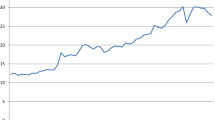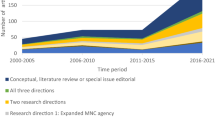Abstract
Semiperipheral states have been characterized as politically tumultuous and economically dynamic. Iraq, in particular, manifests these tendencies. I explore the crucial events, shifts, and discontinuities that add up to Iraq’s changing position within the world-system over the past half century. These elements cannot be studied independent of transformations in the historic “weak state/strong bourgeoisie configuration,” which are integral components of its change. Nor can they be examined apart from world conditions. The outcome of Iraq’s attempts at semiperipheral mobility is also determined by the global petroleum hunger and geopolitical situation. Especially in the last instance, whether the world context is favorable to a particular kind of move virtually determines the outcome.
Similar content being viewed by others
References
ALAVI, HAMZA 1982 State and class under peripheral capitalism. InIntroduction to the sociology of developing societies, edited by Hamza Alavi and Theodor Shanin. London: Macmillan.
ARRIGHI, GIOVANI 1990 The developmentalist illusion: A reconceptualization of the semiperiphery. InSemiperipheral states in the world-economy, edited by William G. Martin, 11–42. Westport, CT: Greenwood Press.
ARRIGHI, GIOVANNI and JESSICA DRANGEL 1986 The stratification of the world-economy: An exploration of the semiperipheral zone.”Review 10, 1 (Summer): 9–74.
AXELGARD, FREDERICK W. 1986 War and oil: Implications for Iraq’s postwar role in Gulf security. InIraq in transition: A political, economic, and strategic perspective, edited by Frederick W. Axelgard. Boulder, CO: Westview Press.
BARAM, AMATZIA 1991Culture, history and ideology in the formation of Ba’thist Iraq, 1968–89. NY: St. Martin’s Press.
BATATU, HANNA 1978The old social classes and the revolutionary movements of Iraq. Princeton, NJ: Princeton University Press.
— 1979 Class analysis and Iraqi society.Mediterranean Peoples 8 (July–Sept.):101–116.
BEBLAWI, HAZEM 1987 The rentier state in the Arab world. InThe Rentier State, Vol. II, edited by Hazem Beblawi and Giacomo Luciani. London: Croom Helm.
CHAUDHRY, KIREN AZIZ 1991 On the way to market: Economic liberalization and Iraq’s invasion of Kuwait.Middle East Report 21 (May/June):14–23.
COCKBURN, ALEXANDER 1991 Beat the devil.The Nation 1991 (25 November): 658–659.
CUSHMAN, JOHN H. JR. 1991 Environmental claims for damage by Iraq go begging for data.New York Times. November 12 (B7).
DAWISHA, ADEED 1986 The politics of war: Presidential centrality, party power, political opposition. InIraq in transition: A political, economic and strategic perspective, edited by Frederick W. Axelgard. Boulder, CO: Westview Press.
EILTS, HERMANN FREDERICK 1991 The Persian Gulf crisis: Perspectives and prospects.Middle East Journal 45 (Winter): 7–29.
EVANS, PETER 1985 Transnational linkages and the economic role of the state. InBringing the state back in, edited by Peter Evans, Dietrich Rueschemeyer, and Theda Skocpol, NY: Cambridge University Press.
FAROUK-SLUGLETT, MARION and PETER SLUGLETT 1987 From gang to elite: The Iraqi Ba’th party’s consolidation of power, 1968–1975.Mediterranean Peoples 40 (July–Sept.): 89–113.
— 1990aIraq since 1958. NY: Tauris and Co. Ltd.
— 1990b Iraqi Ba’thism: Nationalism, socialism and national socialism. Pp. 89–107 in CARDRI,Saddam’s Iraq. London: Zed Books.
FARSOUN, SAMIH 1991 The Middle East in a changing world order. Unpublished manuscript.
FEUILHERADE, PETER 1992 A brisk trade in recrimination.The Middle East 208 (Feb.): 23.
GEREFFI, GARY 1989 Rethinking development theory: Insights from East Asia and Latin America.Sociological Forum 4 (4): 505–533.
GEREFFI, GARY and MIGUEL KORZENIEWICZ 1990 Commodity chains and footwear exports in the semiperiphery. InSemiperipheral states in the world-economy, by William G. Martin. Westport, CT: Greenwood Press.
GERKE, GERWIN 1991 The Iraq development board and British policy, 1945–50.Middle Eastern Studies 27 (April): 231–255.
GERTH, H.H. and C. WRIGHT MILLS 1946From Max Weber: Essays in sociology NY: Oxford University Press.
GOTTHEIL, FRED 1981 Iraqi and Syrian socialism: An economic appraisal.World Development 9 (Sept./Oct.): 825–837.
HAZELTON, FRAN 1990 Iraq to 1963. pp. 1–29 in CARDRI,Saddam’s Iraq. London: Zed Books.
HIRO, DILIP 1991The longest war: The Iran-Iraq military conflict. NY: Routledge.
HOOGLUND, ERIC 1991 The other face of war.Middle East Report 171 (July/Aug.): 3–12.
KARSH, EFRAIM and INARI RAUTSI 1991Saddam Hussein: A political biography. NY: Free Press.
AL-KHAFAJI, ’ISAM 1990 The parasitic base of the Ba’thist regime. Pp. 73–88 in CARDRI,Saddam’s Iraq. London: Zed Books.
AL-KHAFAJI, ’ISAM 1991 The state and Infitah bourgeoisie in the Arab Mashreq: The case of Egypt and Iraq. Unpublished Manuscript.
KHALIDI, WALID 1991 The Gulf crisis: Origins and consequences.Journal of Palestine Studies 20 (Winter): 5–28.
AL-KHALIL, SAMIR 1989Republic of fear. NY: Pantheon Books.
LUMMIS, DOUGLAS 1992 Thoughts after a visit to Iraq.AMPO 23 (2): 41.
LUCIANI, GIACOMO 1987 Allocation vs. production states: A theoretical framework. InThe rentier state, Vol. II, edited by Hazem Beblawi and Giacomo Luciani. London: Croom Helm.
MAKIYA, KANAN 1993Cruelty and silence: War, tyranny, uprising and the Arab world NY: W.W. Norton.
McLACHLAN, KEITH 1979 Iraq: Problems of regional development. InThe integration of modern Iraq, edited by Abbas Kelidar, London: Croom Helm.
MIDDLE EAST 1992 Still there, dividing and ruling.The Middle East 209 (March): 13–15.
MIDDLE EAST REPORT 1991 Rich and poor states in the Arab world.Middle East Report 170 (May/June): 8.
MOFID, KAMRAN 1990 Economic reconstruction of Iraq.Third World Quarterly 12 (January): 48–61.
MORAWETZ, DAVID 1977Twenty-five years of economic development 1950 to 1975. Washington, D.C.: The World Bank.
MUHSIN, HARDING and HAZELTON 1990 Iraq in the Gulf war. Pp. 229–241 in CARDRI,Saddam’s Iraq. London: Zed Books.
PALMER, MONTE 1971 Some political determinants of economic reform: Agrarian reform in Iraq.Journal of Asian and African Studies 6 (July and October): 169–178.
PENROSE, EDITH and E.F. PENROSE 1978Iraq: International relations and national development. Boulder, CO: Westview Press.
PENROSE, EDITH 1979 Industrial policy and performance in Iraq. InThe integration of modern Iraq, edited by Abbas Kelidar, London: Croon Helm.
RAOUF, L.A.N. 1985 Housing and social segregation in Iraq.International Journal of Urban and Regional Research 9 (Sept.): 368–380.
SALAME, GHASSAN, ed. 1987The foundations of the Arab state. London: Croom Helm.
SCIOLINO, ELAINE 1991The outlaw state: Saddam Hussein’s quest for power and the Gulf crisis. NY: Wiley and Sons.
STORK, JOE 1982 State power and economic structure: Class determination and state formation in contemporary Iraq. InIraq: The contemporary state, edited by Tim Niblock. NY: St. Martin’s Press.
TANNER, JAMES 1992 Iraq oil industry rapidly recovers export potential.Wall Street Journal March 26.
UNITED NATIONS 1990National accounts statistics: Main aggregates and detailed tables, 1988. (Part I). NY: United Nations.
WALLERSTEIN, IMMANUEL 1979The capitalist world-economy. NY: Cambridge University Press.
— 1980The modern world-system II: Mercantilism and the consolidation of the European world-economy, 1600–1750. NY: Academic Press.
WHITTLETON, CELINE 1990 Oil and the Iraqi economy. Pp. 54–72 in CARDRI,Saddam’s Iraq. London: Zed Books.
WORLD BANK 1983World tables, 3rd. Ed., Vol. I. Baltimore, MD: Johns Hopkins University Press.
WOYTINSKY, W.S. and E.S. WOYTINSKY 1953World population and production. NY: Twentieth Century Fund.
Additional information
Cynthia Siemsen is a doctoral student in sociology at the University of California at Santa Cruz. Her interests include classical sociological theory, development, and the sociology of law. Work that Ms. Siemsen co-authored with Walter Goldfrank, “Lessons from the Gulf Wars: Hegemonic Decline, Semi-Peripheral Turbulence, and the Role of the Rentier State,” recently appeared in the volume of essays,A New World Order?, edited by David A. Smith and József Böröcz.
Rights and permissions
About this article
Cite this article
Siemsen, C. Oil, war, and semiperipheral mobility: The case of Iraq. Studies in Comparative International Development 30, 24–45 (1995). https://doi.org/10.1007/BF02687158
Issue Date:
DOI: https://doi.org/10.1007/BF02687158




